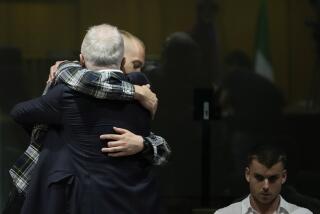Death Verdict for Ex-Marine Who Killed Teens Upheld
- Share via
SAN FRANCISCO — The state Supreme Court on Thursday upheld the death penalty for a former honors student and Marine lieutenant convicted in the 1980 murders of two Fresno teen-agers.
The justices unanimously rejected an appeal from Fernando Eros Caro, 38, found guilty in the kidnaping and fatal shootings of Mary Ellen Booher and Mark Hatcher, two 15-year-old cousins.
“The defendant here committed two senseless and cold-blooded murders of youths who were complete strangers and no threat to him,” the court observed in an opinion by Justice Edward A. Panelli.
Caro, the oldest of eight children of migrant farm laborers in Imperial County, won academic honors and excelled in football as a high school student, studied engineering under a scholarship at San Diego State University and eventually earned aviator’s wings as a lieutenant in the Marines.
In 1975, however, he was convicted and sent to prison in the kidnaping of a 27-year-old San Diego woman. He was paroled in 1978 and worked as a plant watchman in Fresno at the time of the two murders. In a separate case, he was accused but never prosecuted in the murders of two teen-age girls in Bakersfield in 1980.
“He had come out of Brawley and pulled himself up by his boot straps,” state Deputy Atty. Gen. Don Jacobson said Thursday. “But somewhere along the line, he went off the deep end. He turned out to be a vicious killer.”
The two Fresno teen-agers had left Hatcher’s rural home on their bicycles after dinner one evening. Half an hour later, the boy’s mother and grandmother went out for a walk to meet the youths. They heard a gunshot from a nearby orchard and saw a pickup truck leaving the area.
Minutes later they found Hatcher’s body in the orchard, shot in the face. The girl’s body, also shot in the head, was found five days later several miles away.
Later on the evening of the shooting, two local men were shot by the driver of a pickup truck in a dispute over a hit-and-run collision--and one of the victims provided police with a description of their assailant.
Suspicion focused on Caro when the supervisor at the plant where he worked noticed the resemblance between Caro and a police sketch of the suspect. After his arrest, police found a gun in Caro’s apartment that matched a bullet fragment removed from Hatcher’s brain.
Caro denied the charges but was convicted of the murders of the two youths, the kidnaping of the girl and the assaults with intent to murder of the two men who were shot.
In a plea to jurors to spare his life, Caro’s attorneys presented testimony that Caro’s father was an alcoholic, that as a boy Caro had often been struck by his parents and that despite his success in school and the military, he still suffered from “suppressed rage” over a deprived childhood.
A clinical social worker testified that it appeared the defendant had been so disturbed over breaking up with a girlfriend that he killed the teen-agers “in a rage” because he was being denied the happiness they seemed to share.
The prosecution countered that despite his background, Caro deserved no sympathy. The “real tragedy” of the case--beyond the murders themselves--was that “all those opportunities that society gives or holds out for a person . . . were wasted,” Fresno Chief Assistant Dist. Atty. Dennis Beck said.
More to Read
Sign up for Essential California
The most important California stories and recommendations in your inbox every morning.
You may occasionally receive promotional content from the Los Angeles Times.













